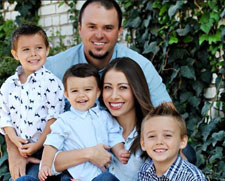Get Help Today
What is ARFID?
Avoidant/Restrictive Food Intake Disorder (ARFID) is a recently recognized eating disorder that affects children, adolescents and adults. People with ARFID have an unsafe aversion to certain foods—or, in some cases, all foods. ARFID is an eating disorder recognized by the most recent edition of the Diagnostic and Statistical Manual of Mental Disorders (DSM-5), which catalogs and classifies various conditions. It differs significantly from more widely known EDs like anorexia nervosa, bulimia nervosa and binge eating disorder.
According to the DSM-5, ARFID’s diagnostic criteria are:
- An eating or feeding disturbance (e.g., apparent lack of interest in eating or food; avoidance based on the sensory characteristics of food; concern about aversive consequences of eating) as manifested by persistent failure to meet appropriate nutritional and/or energy needs associated with one (or more) of the following:
- Significant weight loss (or failure to achieve expected weight gain or faltering growth in children).
- Significant nutritional deficiency.
- Dependence on enteral feeding or oral nutritional supplements.
- Marked interference with psychosocial functioning.
- The disturbance is not better explained by lack of available food or by an associated culturally sanctioned practice.
- The eating disturbance does not occur exclusively during the course of anorexia nervosa or bulimia nervosa, and there is no evidence of a disturbance in the way in which one’s body weight or shape is experienced.
- The eating disturbance is not attributable to a concurrent medical condition or not better explained by another mental disorder. When the eating disturbance occurs in the context of another condition or disorder, the severity of the eating disturbance exceeds that routinely associated with the condition or disorder and warrants additional clinical attention.
In less technical terms, a person with ARFID has a need to avoid or restrict certain foods, or all foods, to an extent that it harms their health. For some people, the disorder focuses on specific textures, colors or types of foods that might be associated with a traumatic event. For other people, the disorder applies to feeding in general. As a result, someone with ARFID doesn’t get enough nutrition to meet their needs, and their overall health declines if the disorder is untreated.
Who it affects: ARFID often affects young children, who depend on adequate nutrition to grow and thrive. It can also occur in adolescents and even adults.
How it develops: People with ARFID have an aversion to eating, or to certain kinds of foods. It could start with a traumatic incident, such as choking on a bite of food. Or it can start if a person has difficulty digesting certain foods. To compensate, a patient might rely on nutritional supplements.
How ARFID is different: ARFID is different from anorexia, bulimia and other eating disorders. ARFID patients have no desire to lose weight or improve their body image. ARFID doesn’t apply to people who follow occasional fasting rituals for religious or other reasons. It doesn’t apply to patients who lose their appetite temporarily, such as while undergoing chemotherapy. It’s different from eating disorders that result from another medical condition. Finally, it is different from food preferences, such as a child who refuses to eat liver.
Signs to look for: People with ARFID might be fearful of eating in general or of eating certain specific foods. They might seem to never have an appetite. They might eat only very small portions or move food around on the plate without eating it. They might use nutritional supplements regularly.

Next Friday marks nine years in recovery for me. Nine years since I chose life. Nine years ago I admitted myself into Rosewood’s care…
Rosewood Uses an Individualized 5-Goal Process to Treat ARFID
Rosewood welcomes ARFID patients as young children. Our approach at Rosewood is always to personalize each patient’s ARFID treatment plan in ways that respond to their individual needs. Our overarching goals for each patient’s recovery program focus on a common set of imperatives that each patient arrives at in their own unique way. These include:
- Ensure the patient is medically stabilized, at a weight level that’s medically appropriate; provide any necessary detoxification under careful medical supervision.
- Develop a comprehensive ARFID treatment plan with input from our multidisciplinary team as well as the patient and family members.
- Work with the patient to detect and deal with any psychiatric illness and psychological challenges associated with ARFID or co-occurring disorder(s).
- Focus on behaviors and thinking processes that impede progress toward lasting recovery.
- Proactively prepare each patient and the family with comprehensive aftercare plans that reduce the chance of relapse.

Our Approach to Treatment for ARFID
Because ARFID develops in patients of different ages for a wide range of reasons, we offer fully customized treatment plans that respond to each patient’s unique needs. As the patient’s recovery progresses, his or her personal treatment program will be adjusted.
Medical Treatment: The first priority in ARFID treatment is addressing and resolving any serious health issues, including malnourishment, heart issues, depression, as well as addiction and other co-occurring disorders. We offer acute-care inpatient services, including medically supervised detox if necessary, to stabilize the patient.
Nutritional Counseling: One of our first priorities when you arrive at Rosewood for treatment is to have you meet with one of our Registered Dietitians (RD) one-on-one. All members of our nutrition staff have at least a Master’s-level degree in nutrition with experience in eating disorders. Additionally, our lead dietitian is a Certified Eating Disorder Registered Dietitian and a Board Certified Specialist in Eating Disorders. Your meeting with the RD helps us customize a nutrition program specifically for you. We’ll seek to evaluate your nutritional needs, assess your unique history and relationship with food, understand the progression of your eating disorder behaviors, learn about any medical complications, dietary allergies and intolerances we need to know about to personalize your meal plan. With this information, the RD will design a customized meal plan for and with you—one you’ll enjoy while you’re with us at Rosewood and long after you complete your ARFID treatment.
Counseling and Therapy: As part of each patient’s multidisciplinary team at Rosewood, a therapist will work with the patient in individual and group settings to help identify and replace any negative thoughts with healthier and less distorted beliefs about themselves and their relationship with food. We also offer a wide range of experiential therapies that help patients heal and grow. These proven therapeutic techniques give patients a chance to deal with tough emotions, stress, insecurities, and relationship problems in a productive way. Therapists will also help patients get past their fears of specific foods or of eating in general. Each patient’s individual treatment plan also contains a strong relapse prevention component.
Levels of Care for ARFID
At Rosewood, our patients enter treatment at the appropriate level of care that is required for their specific situation. This determination is generally based on medical complications, acuity of the eating disorder and results of the patient’s evaluations. As patients move along the path of recovery, they can step-down among the levels of care within our comprehensive services:
- Inpatient Treatment
- Residential Treatment
- Partial Hospitalization (PHP)
- Intensive Outpatient (IOP)
- Extended Day Treatment
- Transitional Living
Is ARFID A Problem For You Or Someone You Love?
Call us now at (888) 228-1253. Our compassionate counselors are available 24/7 to answer your questions in complete confidence.
Rosewood Eating Disorder
Treatment Centers & Locations


Rosewood has done nothing short of save my life.











